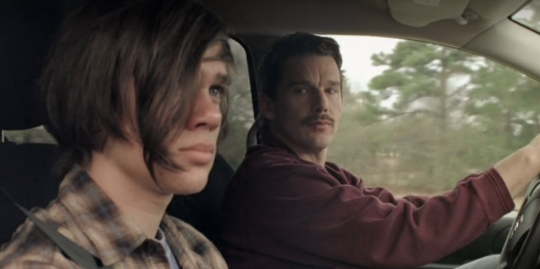Isn’t Everything Autobiographical?: Ethan Hawke In Nine Films And A Novel
By Yasmina Tawil
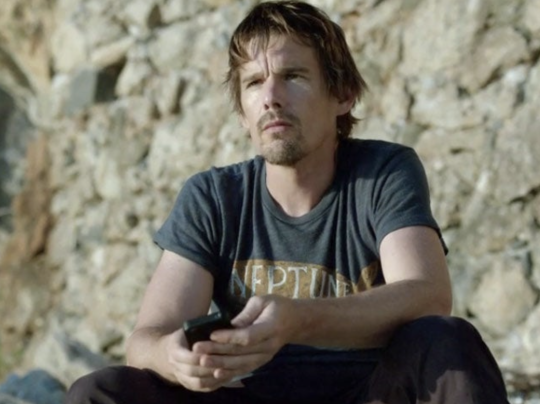
When asked during his first ever on-camera interview if he’d like to continue acting, a young Ethan Hawke replied, “I don’t know if it’s going to be there, but I’d like to do it.” He then gives a guileless shrug of relief as the interview ends, wiping imaginary sweat off his brow. The simultaneous fusion of his nervous energy and poised body language will be familiar to those who’ve seen later interviews with the actor. The practicality and wisdom he exudes at such a young age would prove to be a through-line of his nearly 40-year career. In an interview many decades later, he told Ideas Tap that many children get into acting because they’re seeking attention, but those who find their calling in the craft discover that a “desire to communicate and to share and to be a part of something bigger than yourself takes over, a certain craftsmanship—and that will bring you a lot of pleasure.”
Through Hawke’s dedication to his craft, we’ve also seen his maturation as a person unfold on screen. Though none of his roles are traditionally what we think of when we think of autobiography, many of Hawke’s roles, as well as his work as a writer, suggest a sort of fictional autobiographical lineage. While these highlights in his career are not strictly autofiction, one can trace Hawke’s Künstlerromanesque trajectory from his childhood ambitions to his life now as a man dedicated to art, not greatness.
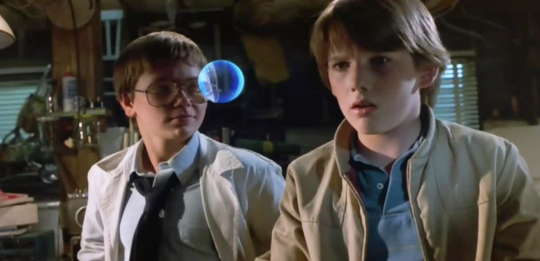
Hawke’s first two films, Joe Dante’s sci-fi fantasy Explorers with River Phoenix and Peter Weir’s Dead Poets Society with Robin Williams, set the tone for a diverse filmography filled with popcorn fare and indie cinema in equal measure, but they also served as touchstones in his development as person drawn to self-expression through art. In an interview with Rolling Stone’s David Fear, Hawke spoke about the impact of these two films on him as an actor. When River Phoenix, his friend and co-star in Explorers, had his life cut short by a drug overdose, it hit Hawke personally. He saw from the inside what Hollywood was capable of doing to young people with talent. Hawke never attempted to break out, to become a star. He did the work he loved and kept the wild Hollywood lifestyle mostly at arm’s length.
Like any good film of this genre, Dead Poets Society is not just a film about characters coming of age, but a film that guides the viewer as well, if they are open to its message. Hawke’s performance as repressed schoolboy Todd in the film is mostly internal, all reactions and penetrating glances, rather than grandiose movements or speeches. Through his nervy body language and searching gaze, you can feel both how closed off to the world Todd is, and yet how willing he is to let change in. Hawke has said working on this film taught him that art has a real power, that it can affect people deeply. This ethos permeates many of the characters Hawke has inhabited in his career.
In Dead Poets Society, Mr. Keating (Robin Williams) tells the boys that we read and write poetry because the human race is full of passion. He insists, “poetry, beauty, romance, love—these are what we stay alive for.” Hawke gave a 2020 TEDTalk entitled Give Yourself Permission To Be Creative, in which he explored what it means to be creative, pushing viewers to ask themselves if they think human creativity matters. In response to his own question, he said “Most people don’t spend a lot of time thinking about poetry, right? They have a life to live and they’re not really that concerned with Allen Ginsberg’s poems, or anybody’s poems, until their father dies, they go to a funeral, you lose a child, somebody breaks your heart, they don’t love you anymore, and all of the sudden you’re desperate for making sense out of this life and ‘has anyone ever felt this bad before? How did they come out of this cloud?’ Or the inverse, something great. You meet somebody and your heart explodes. You love them so much, you can’t even see straight, you know, you’re dizzy. ‘Did anybody feel like this before? What is happening to me?’ And that’s when art is not a luxury. It’s actually sustenance. We need it.”
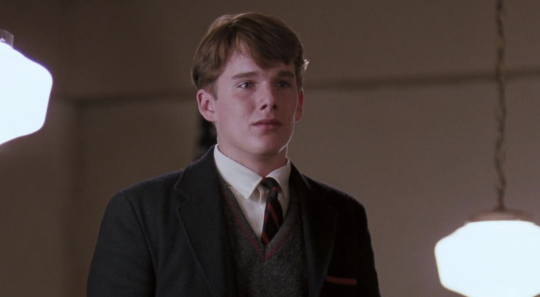
Throughout many of his roles post-Dead Poets Society, Hawke explores the nature of creativity through his embodiment of writers and musicians. Often these characters are searching for a greater purpose through art, while ultimately finding that human connection is the key. Without that human connection, their art is nothing.
We see the first germ of this attraction to portray creative people on screen with his performance as Troy Dyer in Reality Bites. As Troy Dyer, a philosophy-spouting college dropout turned grunge-band frontman in Reality Bites, Hawke was posited as a Gen-X hero. His inability to keep a job and his musician lifestyle were held in stark contrast to Ben Stiller’s yuppie TV exec Michael Grates. However in true slacker spirit, he isn’t actually committed to the art of music, often missing rehearsals, as Lelaina points out. Troy even uses his music at one point to humiliate Lelaina, dedicating a rendition of “Add It Up” by Violent Femmes to her. The lyrics add insult to injury as earlier that day he snuck out of her room after the two had sex for the first time. Troy’s lack of commitment to his music matches his inability to commit to those relationships in his life that mean the most to him.
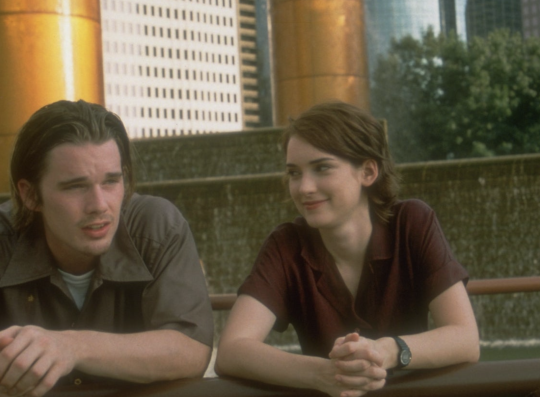
Reality Bites is also where he first positioned himself as one of the great orators of modern cinema.” Take this early monologue, in which he outlines his beliefs to Winona Ryder’s would-be documentarian Lelaina Pierce: “There’s no point to any of this. It’s all just a random lottery of meaningless tragedy and a series of near escapes. So I take pleasure in the details. You know, a quarter-pounder with cheese, those are good, the sky about ten minutes before it starts to rain, the moment where your laughter become a cackle, and I, I sit back and I smoke my Camel Straights and I ride my own melt.”
Hawke brings the same intense gaze to this performance as he did to Dead Poets Society, as if his eyes could swallow the world whole. But where Todd’s body language was walled-off, Troy’s is loud and boisterous. He’s quick to see the faults of those around him, but also the good things the world has to offer. It’s a pretty honest depiction of how self-centered your early-20s tend to be, where riding your own melt seems like the best option. As the film progresses, Troy lets others in, saying to Lelaina, “This is all we need. A couple of smokes, a cup of coffee, and a little bit of conversation. You, me and five bucks.”
Like the character, Hawke was in his early twenties and as he would continue to philosophize through other characters, they would age along with him and so would their takes on the world. If you only engage with anyone at one phase in their life, you do a disservice to the arc of human existence. We have the ability to grow and change as we learn who we are and become less self-centered. In Hawke’s career, there’s no better example of this than his multi-film turn as Jesse in the Before Trilogy. While the creation of Jesse and Celine are credited to writer-director Richard Linklater and his writing partner Kim Krizan, much of what made it to the screen even as early as the first film were filtered through the life experiences of Hawke and his co-star Julie Delpy.
In a Q&A with Jess Walter promoting his most recent novel A Bright Ray of Darkness, Hawke said that Jesse from the Before Trilogy is like an alt-universe version of himself, and through them we can see the self-awareness and curiosity present in the early ET interview grow into the the kind of man Keating from Dead Poets Society urged his students to become.
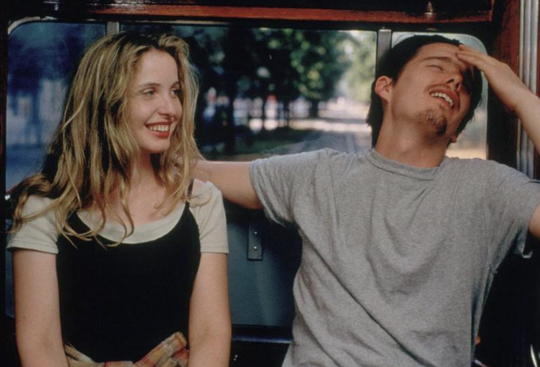
In Before Sunrise, Hawke’s Jesse is roughly the same age as Troy in Reality Bites, and as such is still in a narcissistic phase of his life. After spending several romantic hours with Celine in Vienna, the two share their thoughts about relationships. Celine says she wants to be her own person, but that she also desperately wants to love and be loved. Jesse shares this monologue, “Sometimes I dream about being a good father and a good husband. And sometimes it feels really close. But then other times it seems silly, like it would ruin my whole life. And it’s not just a fear of commitment or that I’m incapable of caring or loving because… I can. It’s just that, if I’m totally honest with myself, I think I’d rather die knowing that I was really good at something. That I had excelled in some way than that I’d just been in a nice, caring relationship.”
The film ends without the audience knowing if Jesse and Celine ever see each other again. That initial shock is unfortunately now not quite as impactful if you are aware of the sequels. But I think it is an astute look at two people who meet when they are still discovering who they are. Still growing. Jesse, at least, is definitely not ready for any kind of commitment. Then of course, we find out in Before Sunset that he’s fumbled his way into marriage and fatherhood, and while he’s excelling at the latter, he’s failing at the former.
As in Reality Bites, Hawke explores the dynamics of band life again in Before Sunset, when Jesse recalls to Celine how he was in a band, but they were too obsessed with getting a deal to truly enjoy the process of making music. He says to her, “You know, it’s all we talked about, it was all we thought about, getting bigger shows, and everything was just…focused on the future, all the time. And now, the band doesn’t even exist anymore, right? And looking back at the… at the shows we did play, even rehearsing… You know, it was just so much fun! Now I’d be able to enjoy every minute of it.”
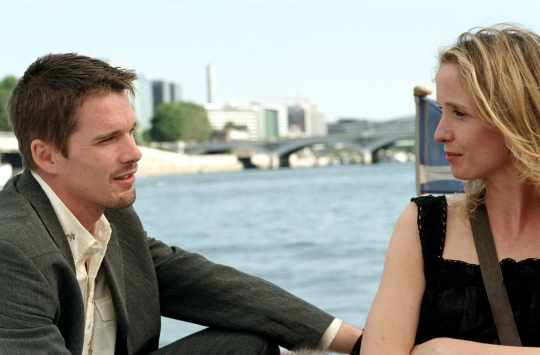
The filming of Before Sunset happened to coincide with the dissolution of Hawke’s first marriage. And while these films are not autobiographical, everyone involved have stated that they’ve added personal elements to their characters. They even poke fun at it in the opening scene when a journalist asks how autobiographical Jesse’s novel is. True to form, he responds with a monologue, “Well, I mean, isn’t everything autobiographical? I mean, we all see the world through our own tiny keyhole, right? I mean, I always think of Thomas Wolfe, you know. Have you ever seen that little one page note to reader in the front of Look Homeward, Angel, right? You know what I’m talking about? Anyway, he says that we are the sum of all the moments of our lives, and that, anybody who sits down to write is gonna use the clay of their own life, that you can’t avoid that.”
While Before Sunset was shot in 2003, released in 2004 and this monologue refers to the fictional book within the trilogy entitled This Time, Hawke would take this same approach more than a decade later with his novel A Bright Ray of Darkness.
In the novel, Hawke crafts a quasi-autobiographical story, using his experience in theater to work through the perspective he now has on his failed marriage to Uma Thurman. Much like Jesse in Before Sunset, Hawke is reluctant to call the book autobiographical, but the parallels to his own divorce are evident. And as Jesse paraphrased Wolfe, isn’t everything we do autobiographical? In the book, movie star William Harding has blown up his seemingly picture-perfect marriage with a pop star by having an affair while filming on location in South Africa. The book, structured in scenes and acts like a play, follows the aftermath as he navigates his impending divorce, his relationship with his small children, and his performance as Hotspur in a production of Henry IV on Broadway.
Throughout much of the novel, William looks back at the mistakes he made that led to the breakup of his marriage. He’s now in his 30s and has the clarity to see how selfish he was in his 20s. Hawke, however, was in his forties while writing the book. Through the layers of hindsight, you can feel how Hawke has processed not just the painful emotional growth spurt of his 20s, but also the way he can now mine the wisdom that comes from true reflection. Still, as steeped as the novel is in self-reflection, it does not claim to have all the answers. In fact, it offers William, as well as the readers, more questions to contemplate than it does answers.
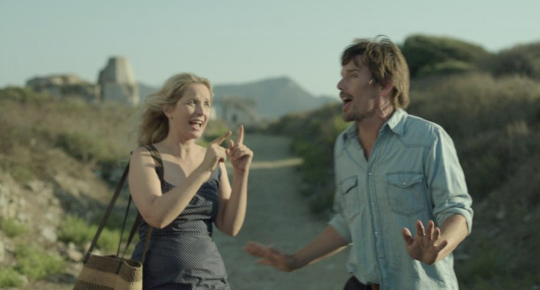
The wisdom to know that you will never quite understand everything is broached by Hawke early in the third film in the Before Trilogy, 2013’s Before Midnight. At this point in their love story, Jesse’s marriage has ended and he and Celine are parents to twin girls. Jesse has released two more books: That Time, which recounts the events of the previous film, and Temporary Cast Members of a Long-Running But Little Seen Production of a Play Called Fleeting. Before Midnight breaks the bewitching spell of the first two films by adding more cast members and showing the friction that comes with an attempt to grow old with someone. When discussing his three books, a young man says the title of his third is too long, Jesse says it wasn’t as well loved, and an older professor friend says it’s his best book because it’s more ambitious. It seems Linklater and company already knew how the departure of this third film might be regarded by fans. But it is this very departure that shows their commitment to honestly showing the passage of time and our relationship to it.
About halfway through the film Jesse and Celine depart the Greek villa where they have been spending the summer, and we finally get a one-on-one conversation like we’re used to with these films. In one exchange, I feel they summarize the point of the entire trilogy, and possibly Hawke’s entire ethos:
Jesse: Every year, I just seem to get a little bit more humbled and more overwhelmed about all the things I’m never going to know or understand.
Celine: That’s what I keep telling you. You know nothing!
Jesse: I know, I know! I’m coming around!
[Celine and Jesse laugh.]
Celine: But not knowing is not so bad. I mean, the point is to be looking, searching. To stay hungry, right?
Throughout the series, Linklater, Delpy, and Hawke explore what they call the “transient nature of everything.” Jesse says his books are less about time and more about perception. It’s the rare person who can assess themselves or the world around them acutely in the present. For most of us, it takes time and self-reflection to come to any sort of understanding about our own nature. Before Midnight asks us to look back at the first two films with honesty, to remove the romantic lens with which they first appeared to us. It asks us to reevaluate what romance even truly is.
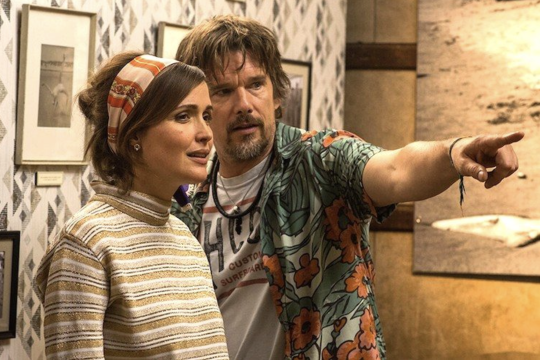
Hawke explores this same concept again in the 2018 romantic comedy Juliet, Naked. In this adaptation of the 2009 Nick Hornby novel, Hawke plays a washed-up singer-songwriter named Tucker Crowe. He had a big hit album, Juliet, in the early ‘90s and then disappeared into obscurity. Rose Bryne plays a woman named Annie whose longtime boyfriend Duncan is obsessed with the singer and the album, stuck on the way the bummer songs about a bad breakup make him feel. As the film begins, Annie reveals that she thinks she’s wasted 15 years of her life with this schmuck. This being a rom-com, we know that Hawke and Byrne’s characters will eventually meet-cute. What’s so revelatory about the film is its raw depiction of how hard it is for many to reassess who they really are later in life.
Duncan is stuck as the self-obsessed, self-pitying person he likely was when Annie first met him, but she reveals he was so unlike anyone else in her remote town that she looked the other way for far too long. Now it’s almost too late. By chance, she connects with Crowe and finds a different kind of man.
See, when Crowe wrote Juliet, he also was a navel-gazing twentysomething whose emotional development had not yet reached the point of being able to see both sides in a romantic entanglement. He worked through his heartbreak through art, and though it spoke to other people, he didn’t think about the woman or her feelings on the subject. In a way, Crowe’s music sounds a bit like what Reality Bites’s Troy Dyer may have written, if he ever had the drive to actually work at his music. Eventually, it’s revealed that Crowe walked away from it all when Julie, the woman who broke his heart, confronted him with their child—something he was well aware of, but from which he had been running away. Faced with the harsh reality of his actions and the ramifications they had on the world beyond his own feelings, he ran even farther away from responsibility. In telling the story to Annie, he says, “I couldn’t play any of those songs anymore, you know? After that, I just… I couldn’t play these insipid, self-pitying songs about Julie breaking my heart. You know, they were a joke. And before I know it, a couple of decades have gone by and some doctor hands me… hands me Jackson. I hold him, you know, and I look at him. And I know that this boy… is my last chance.”
When we first meet Crowe, he’s now dedicated his life to raising his youngest son, having at this point messed up with four previous children. The many facets of parenthood is something that shows up in Hawke’s later body of work many times, in projects as wholly different as Brooklyn’s Finest, Before Midnight, Boyhood, Maggie’s Plan, First Reformed, and even his novel A Bright Ray of Darkness. In each of these projects, decisions made by Hawke’s characters have a big impact on their children’s lives. These films explore the financial pressures of parenthood, the quirks of blended families, the impact of absent fathers, and even the tragedy of a father’s wishes acquiesced without question. Hawke’s take on parenthood is that of flawed men always striving to overcome the worst of themselves for the betterment of the next generation, often with mixed results.
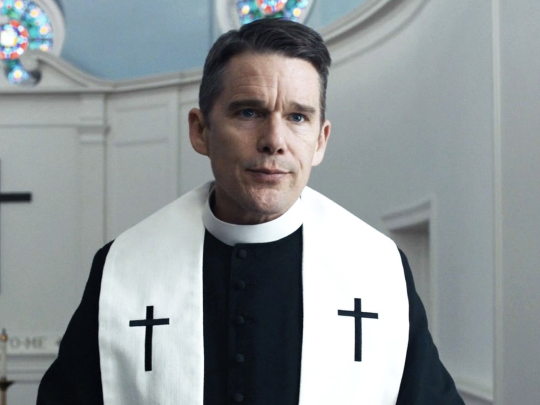
Where Juliet, Naked showed a potential arc of redemption for a father gone astray, First Reformed paints a bleaker portrait. Hawke plays Pastor Toller, a man of the cloth struggling with his own faith who attempts to counsel an environmental activist whose impending fatherhood has driven him to suicidal despair. Toller himself is struggling under the weight of fatherhood, believing he sent his own son to die a needless death in a morally bankrupt war. Sharing the story, he says “My father taught at VMI. I encouraged my son to enlist. It was the family tradition. Like his father, his grandfather. Patriotic tradition. My wife was very opposed. But he enlisted against her wishes… . Six months later he was killed in Iraq. There was no moral justification for this conflict. My wife could not live with me after that. Who could blame her? I left the military. Reverend Jeffers at Abundant Life Church heard about my situation. They offered me a position at First Reformed. And here I am.” How do we carry the weight of actions that affect lives that are not even our own?
If Peter Weir set the father figure template in Dead Poets Society, and Paul Schrader explored the consequences of direct parental influence on their children’s lives, director Richard Linklater subverts the idea of a mentor-guide in Boyhood, showing both parents are as lost as the kid himself. When young Mason (Ellar Coltrane) asks his dad (Hawke) what’s the point of everything, his reply is “I sure as shit don’t know. Nobody does. We’re all just winging it.” As the film ends, Mason sits atop a mountain with a new friend he’s made in the dorms discussing time. She says that everyone is always talking about seize the moment—carpe diem!—but she thinks it’s the other way around. That the moments seize us. In Reality Bites, Troy gets annoyed at Lelaina’s constant need to “memorex” everything with her camcorder, yet Boyhood is a film about capturing a life over a 12-year period. The Before Trilogy checks in on Jesse and Celine every nine years. Hawke’s entire career. in fact, has captured his growth from an awkward teen to a prolific artist and devoted father, a master of his craft and philosopher at heart.
